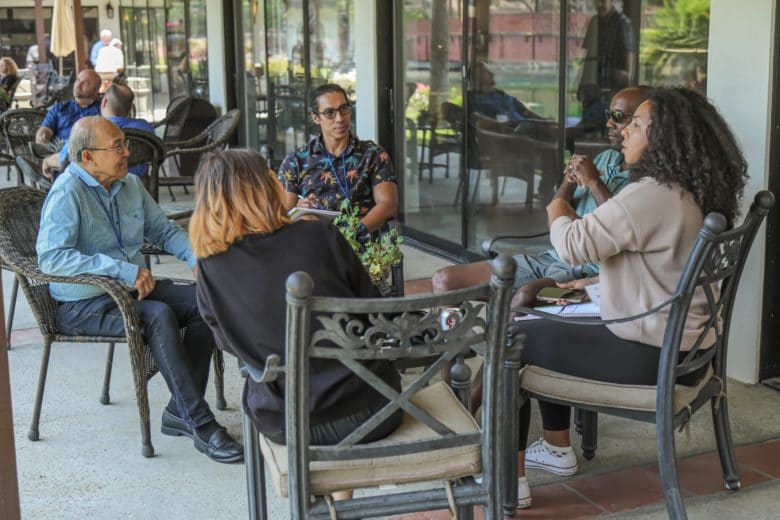“My job is to honestly preach the word, not to hold people accountable,” said the slightly defensive Christian leader to my friend. It is a common perception among us pastors. A hands-off approach lets us off the hook. We say things like; “I will do my part, God will do His.” Or “Everyone has free will. Our job is to give them the Gospel (information), they choose what they want to do with it.”
There is truth to these statements. Where we go wrong is when we label the above as discipleship. Is the idea of “live and let live”, a Biblical approach to discipleship? Is a “you do you” worldview taking precedence over living and ministering like Jesus?

5 Problems With Our Current Models
1. We are afraid to call people to become disciples.
Jesus wasn’t. He boldly confronted the casual follower who proclaimed allegiance. “I will follow you wherever you go,” they said. Jesus answered by making clear the cost involved in becoming His disciple.
Our Lord didn’t try to make it easy. He wanted potential disciples to count the cost. Our focus so often is on church attendance. It is the metric used to measure success. When we use that as our standard, what people do with what they hear is not our concern. This must change. Jesus’ kingdom is not made up of church adherents or Instagram followers. It is built on committed disciples of Christ who walk in obedience to His commands and are consistently growing in their allegiance to Him.
If we call people to be accountable, to actually “put into practice” what Jesus taught, some may leave. They might not like us or come to our church anymore. This is a risk we must be willing to take to obey Christ’s command to make disciples of all.
2. A church-building-based model lends itself to walk-in, walk-out Christianity.
In pre-covid days, mega-churches provided the perfect place for a casual Christian to feel comfortable. You could go to church, park in the parking lot, slip in, sit in the back few rows of a darkened auditorium, slip out, and go for lunch. You barely needed to do more than greet the greeters at the door.
Post-covid (can we even say that yet??), it’s even worse. Online sermons suffice. You can even skip the worship if you want and go straight to the message (or vice-versa). I’m not accusing, just stating the facts about our current situation.
In our “new normal” where does disciple-making happen? We walk in and do our weekly Christian duty, and walk out emotionally stirred or entertained, but with no accountability to apply what we have heard. Sadly, this model, so common in the West, has been exported across the globe. It is having devastating effects on discipleship. We must rethink our models if we want to see movements multiply. Resist the influence of the models around you and look to Christ’s example.
3. We don’t make time to model ministry and train disciples.
Seminary and Bible college training has been focused on knowledge more than ministry skills including disciple-making. If you know the right thing you will be able to do the right thing, we assume. It’s not so. Again, this model of training ministers has influenced Christianity worldwide.
Jesus trained His disciples up close and personal. They walked with Him, talked with Him, ate with Him, and joined Him in healing the sick, casting out demons, and proclaiming God’s kingdom to the lost.
Christian clergy, myself at times included, are too busy with ministerial duties to train disciples this way. We settle for something less…the transfer of knowledge. How do we change?
Is there a young person you could invite to walk, talk, eat and do ministry by your side? A new believer you could show how to share their testimony with a person at the gas station? Then perhaps you could ask them to go share with the next person they meet while you watch, pray, and encourage? Let’s get out of the classroom transfer of knowledge and train disciples to obey Christ.
Are there times when you would normally teach, that you could instead practice ministry skills with those you are training? Or perhaps open the door for others to teach part of the lesson/message rather than being the “sage on the stage” all the time?
Those who see Disciple Making Movements (DMMs) begin are those who learn to train, not only teach, their disciples.
4. The emphasis is not on the priesthood of all believers, nor our responsibility to train all to minister.
This cannot be overstated or too often repeated. We must train all to reach all. Every Jesus follower must grow in confidence and competence in disciple-making. Why? Because Jesus’ command is for all who follow His way. It’s not only for us as ordained clergy.
We get stuck in an Old Testament pattern of operating. The clergy/laity divide is almost as strong today as the separation between Levites and ordinary Jews was in the Old Testament. Jesus came and changed that, to establish a New Covenant. Let’s embrace and operate in a New Testament understanding of the priesthood of all believers. That means we have a responsibility to pass on what we know to others, to develop, and make room for the practice and exercise of their spiritual gifts.
In Disciple Making Movements (DMMs), every believer is given opportunity and responsibility. Because groups and churches meet in homes or shops these groups are small. Everyone gets a chance to talk, to pray, to interact with Scripture. They exercise their spiritual gifts and are constantly stretched to trust God to release those gifts to them.
5. Friendly accountability is essential, but how do we get there?
Turning the tide is difficult. Our Christian culture is strongly established. We have trained people to sit in pews, to be entertained rather than teaching them to obey. Because we don’t expect application from those we teach, we don’t get it. Seriously, when you preach a sermon, what percentage do you expect to even remember it a week later? Let alone apply and pass it on to others? It may be difficult, but we have to start somewhere. The ship has to turn.
What will you do to help bring change?
Let me know in the comments below or on the DMMs Frontier Missions Facebook Group.
NOTE: This article is an excerpt that will be published fully in the next issue of Mission Frontiers.




Comments
So wonderful teaching. I give to it 100% .Thank you so much for. Precedency = Yes, ” Jesus’ kingdom is not made up of church adherents or Instagram followers. It is built on committed disciples of Christ who walk in obedience to His commands and are consistently growing in their allegiance to Him.” ”
Jesus trained His disciples up close and personal. They walked with Him, talked with Him, ate with Him, and joined Him in healing the sick, casting out demons, and proclaiming God’s kingdom to the lost. Above phrases are so LOVLY
I think a good friend group is very influential for accountability and discipleship and missional purposes.
I truly appreciate this article friendship, accountability, and obedience to God’s word are key in discipleship. thank you
.